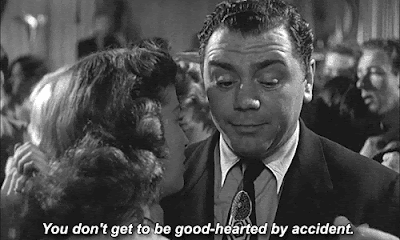Marty (Delbert Mann, 1955) It was a strange dichotomy—the motion picture studios were fighting off the insurgency of television sets into American house-holds, competing against it by offering exotic locations, widescreen aspect ratios and other innovations like 3-D and stereophonic sound (we won't even get into what William Castle was doing!), even air-conditioning, in an attempt to get people off their convenient couches and away from the primitive flickering black and white images on their square TV sets and back into theaters for their distractions. At the same time, writers and other craftsmen were finding work in the nascent television field where home-grown stories with a less spectacular dimension requirement could be produced quickly and with less studio interference (for them, sponsors were the problem).
Marty began as a television play broadcast in 1953 on The Philco-Goodyear Television Playhouse, starring Rod Steiger in the titular role. Movie rights were bought up by the Hecht-Lancaster Production company (formed by Burt Lancaster and his agent Harold Hecht) and it was their first project without Lancaster starring. Steiger bowed out, not wanting to be tied to a multi-picture contract to Hecht-Lancaster and the part went to an unlikely candidate, Ernest Borgnine, with whom Lancaster had worked on From Here to Eternity and Vera Cruz, and who had just finished filming Bad Day at Black Rock. The casting couldn't have been more against "type"—Borgnine was usually being cast as heavies, bullies, villains, or even (in From Here to Eternity) a downright sadist.
But, Marty was different. Marty Piletti (Ernest Borgnine) is an approaching-middle-age butcher (he's 35) in the Bronx. He makes an okay living—he gets by, has some money saved and could see himself buying his own place—but still lives with his mother (Esther Minciotti) for the usual reasons: Dad's gone, Mom's living alone (except for him), she's a bit of a noodge, and he has a severe failure to launch.
Not that he doesn't want to. He's just not the sort of man who attracts attention. "I gotta admit, whatever it is women like, I ain't got it!" He's a butcher, fercryinoutloud, he doesn't even get any respect from his customers who don't even expect a thumb on the scale when they tell him he "oughta be ashamed of himself" for not being married when his younger siblings got married long ago. He's a nice guy. But "an ugly, fat" nice guy. And "time goes on, boy" and the years pile up and before you know it, you haven't done nothing.
But, what do you expect when the weekend comes and you end up with the same crowd on the same street-corner and you say the same thing over and over again like a mantra (but a mantra that doesn't DO anything): "Whadaya wanna do tonight, Marty?" "I dunno, Anj' (Joe Mantell), whadda YOU wanna do?" His contemporary pals are basically running in place, not going forward with their lives for fear of rejection or just plain lethargy. You develop a hard skin, like an antipathy towards women, or, worse, an antipathy towards yourself. Why have your worst faults thrown in your face again and again? Why have it proven again that you don't measure up? Why get your hopes up only to have them dashed? Why risk the pain? Better to just drift with what you're used to. It may be boring, and it may even be irritating, but it's comfortable.Marty is a movie about being alone in a city of millions, where the opposite of love isn't hate—it's indifference. People collide into each other and don't even notice the collision. But, the next day they'll notice the bruise and wonder where that came from. It's intimate. It knows people. And it recognizes how you can want the best AND the worst for someone, if it comes out a little bit in your favor. There's something a little sweet and a lot of sour about it.There's a lot of irony there. But, the big irony is that it wasn't something in widescreen Vistavision and Hi-Fidelity sound. It wasn't even in color, but the same black-and-white you'd find on your humming television set back home (and it was in Academy ratio too, which is what the TV tube was).And the biggest irony is that this product of television—that looked a lot like television—won The Best Picture Oscar for its year (and the Palme D'Or at Cannes!) over the movies that were being put out to compete with television. And Best Actor. And Best Screenplay. And Best Director.








No comments:
Post a Comment